R&D Expensing: Q&A with Sen. Young

The NAM recently talked to Sen. Todd Young (R-IN) about the importance of reinstating immediate expensing for research-and-development expenditures. Here’s the full interview:
NAM: Sen. Young, Congress is facing a “Tax Armageddon” next year, as crucial provisions from 2017’s Tax Cuts and Jobs Act are set to expire. As a member of the Senate Finance Committee, what is your focus moving into next year’s debate?
Sen. Young: The Tax Cuts and Jobs Act was a great success—millions of Americans, especially those in the middle class—saw their taxes go down. Corporate tax receipts went up. We stemmed the tide of corporate inversions, and many companies chose to return their operations and tax bases to the United States. If Congress does not act next year to extend provisions of the TCJA, we will undo all of these victories and inflict long-lasting damage on our economy. As we prepare for next year, I am focused on evaluating how best we can build upon our TCJA successes and continue to adopt pro-growth, fiscally responsible tax policy that helps hardworking Americans thrive.
NAM: As you know, for nearly 70 years, manufacturers in the U.S. were able to fully deduct their R&D expenses in the year incurred. Beginning in 2022, however, manufacturers were forced to spread their deductions over several years, greatly harming our ability to grow and compete. What is Congress doing to restore immediate R&D expensing?
Sen. Young: For several years now, I have advocated for the American Innovation and Jobs Act (S. 866), my bill with Sen. Maggie Hassan (D-NH) that would restore full and immediate expensing of R&D expenditures. We first introduced the bill back in 2020 well before the provision expired, and I am disappointed that we are now reaching the end of 2024—nearly three years after the law shifted to amortization of R&D investments—and Congress has yet to pass our bill to fix this crucial issue. As our global competitors, like China, are expanding their R&D incentives, we simply cannot allow our nation and our economy to be left behind. Congress must work to restore our R&D incentives as soon as possible, and this will be one of my top priorities heading into next year’s tax negotiations.
NAM: As a senator who was there during the Tax Cuts and Jobs Act, you know how impactful the legislation was for manufacturers to be able to compete on a global level. As we get closer to next year, what are you hearing from stakeholders on the need for pro-growth tax policy so American businesses can engage and grow around the world?
Sen. Young: At the risk of oversimplifying the issue, it really comes down to competitiveness. A lot of the work I have done in the tax space as well as in other areas is focused on ensuring that America’s position as a global leader remains strong. Without growth, our economy suffers and our ability to remain internationally competitive is diminished. This is a massive national security risk. So, as I look ahead to what next year may hold in the tax arena, I am focused on pro-growth tax policy. We need to be thinking creatively about ways we can add value to our economy and, in turn, ensure Americans are better off.
In different industries this takes on different forms; however, one common thread is the need for R&D. To grow and develop new products, businesses have to put significant amounts of capital into R&D costs, both domestically and internationally. That is why one of my core areas of focus continues to be restoring full and immediate expensing of R&D costs. It is vital for the health of our economy that we take this action, which allows safer and more innovative products to be brought to the marketplace; increases the number of [well]-paying, high-skilled jobs; and secures U.S. interests abroad by ensuring we remain globally competitive.
NAM: Thank you, Sen. Young. What else can NAM members do to stay engaged and be a resource for you going into next year?
Sen. Young: I have always appreciated the NAM’s partnership and advocacy as we work together on these important issues. I would encourage NAM members to continue sharing stories with their elected federal officials of the importance of these tax incentives, like R&D, that enable the creation of high-quality jobs, promote our national competitiveness and strengthen our economy. Your voice matters.
R&D Expensing: Q&A with Rep. Estes
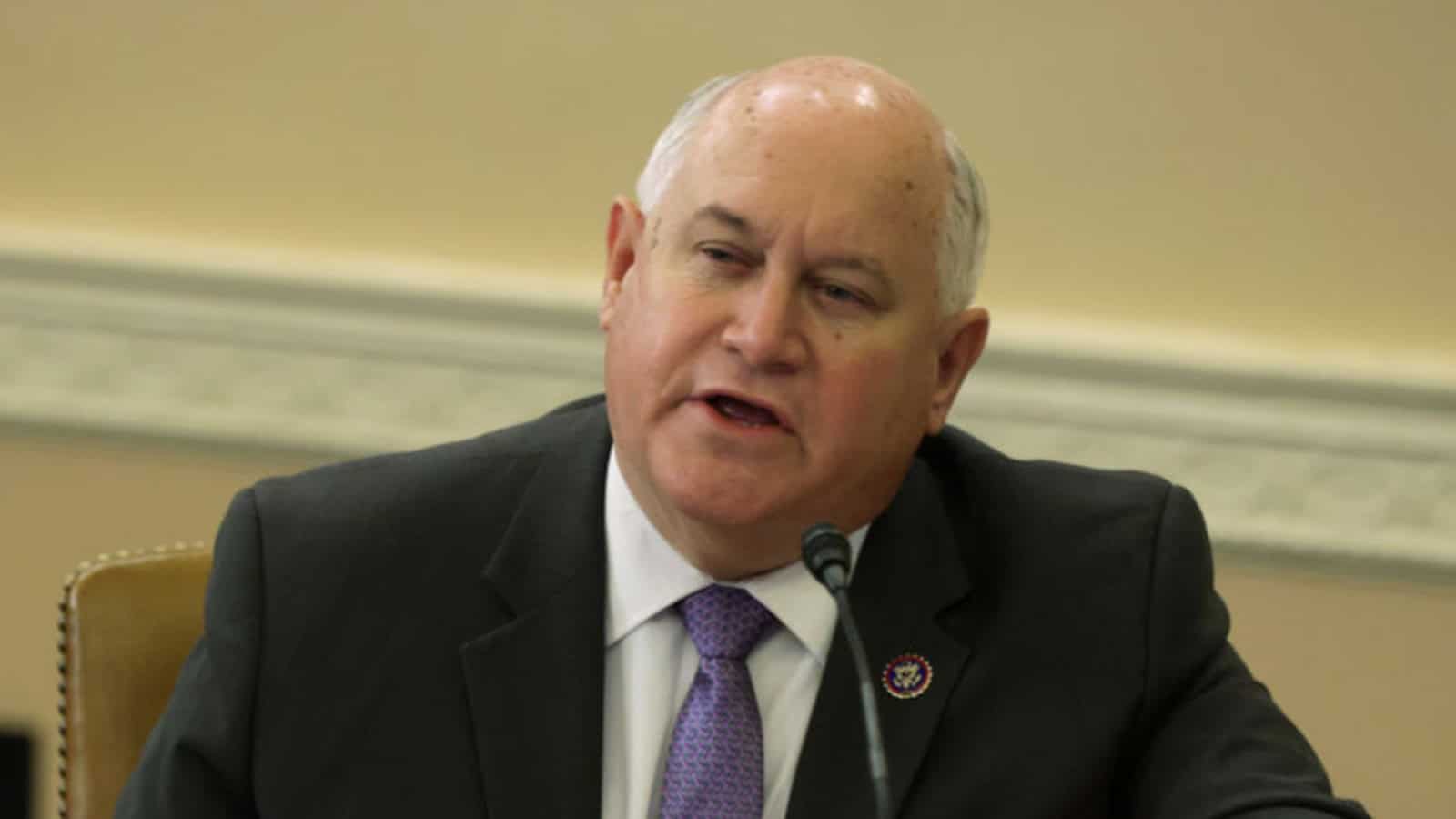
The NAM recently talked to Rep. Ron Estes (R-KA), chair of the U.S. Innovation Tax Team, to learn what he and his colleagues are doing to fight for the return of immediate research-and-development expensing. Here’s the full interview:
NAM: Rep. Estes, Congress is facing a “Tax Armageddon” next year, as crucial provisions from 2017’s Tax Cuts and Jobs Act are set to expire. As a member of the Ways and Means Committee, what is your focus moving into next year’s debate?
Rep. Estes: The Tax Cuts and Jobs Act did so much to encourage economic growth and make the United States competitive globally. Today, about half of the members serving in Congress weren’t in office in 2017 when we passed this landmark legislation, so there’s a lot of educating that’s been happening, not just for the general public but for our members as well. Ways and Means Republicans are taking this opportunity to examine what worked and ways to improve and expand the legislation. Ways and Means Chairman Jason Smith (R-MO) established 10 tax teams to address various parts of the bill, and I’ve been leading the U.S Innovation Tax Team.
NAM: As you well know, for nearly 70 years, manufacturers in the U.S. were able to fully deduct their R&D expenses in the year incurred. Beginning in 2022, however, manufacturers were forced to spread their deductions over several years, greatly harming our ability to grow and compete. What is Congress doing to restore immediate R&D expensing?
Rep. Estes: I’ve introduced legislation—the American Innovation and R&D Competitiveness Act—to address this issue. It’s bipartisan legislation that is supported by 220 colleagues, nearly evenly divided between Republicans and Democrats. Those provisions were also included in the House-passed Tax Relief for American Families and Workers Act, which would have been a welcome fix. However, election-year politics has stalled that bill in the Senate. But manufacturers and innovators need action on immediate R&D expensing now, and it’s something the Senate should still address before the next Congress begins in January.
NAM: Your U.S. Innovation Tax Team has been very busy this year, as you’ve held several roundtables and been receiving feedback focused on the importance of U.S. manufacturers having a chance to compete around the globe. As we get closer to next year, what is your tax team hearing from stakeholders on the need for American businesses to engage and grow around the world?
Rep. Estes: The U.S. Innovation Tax Team has hosted roundtables and listening sessions with innovators and manufacturers across the country. Their message has been consistent and clear: we need a stable tax code that encourages innovation through R&D immediate expensing, continues good policies like FDII [the foreign-derived intangible income deduction] and discourages foreign extraterritorial taxes that are out to pilfer from American innovators. A manufacturer in rural Kansas told me about how the change in immediate R&D expensing has changed their plans for expansion. This is a major employer in a small town, so the impact isn’t just about the business, but it’s also about the jobs that are impacted when R&D is stifled. At the same time, China is offering a 200% super deduction and is working to expand R&D in their country. We can’t cede our dominance in manufacturing, research and development.
NAM: Thank you, congressman. What else can NAM members do to stay engaged and be a resource for you going into next year?
Rep. Estes: The best thing for NAM members to do is to continue talking about the benefits of the Tax Cuts and Jobs Act and the importance of R&D expensing for manufacturers and workers. Unfortunately, there’s a lot of misinformation about the impact of the 2017 tax law, but even the New York Times admitted in 2019 that the Tax Cuts and Jobs Act benefitted most Americans, saying in their headline, “Face It: You (Probably) Got a Tax Cut,” and going on to say, “Studies consistently find that the 2017 law cut taxes for most Americans. Most of them don’t buy it.” Americans, small businesses, innovators and manufacturers need us to extend and expand the 2017 tax law to encourage the kind of economic growth we experienced just several years ago.
Why Manufacturers Need Immediate R&D Expensing
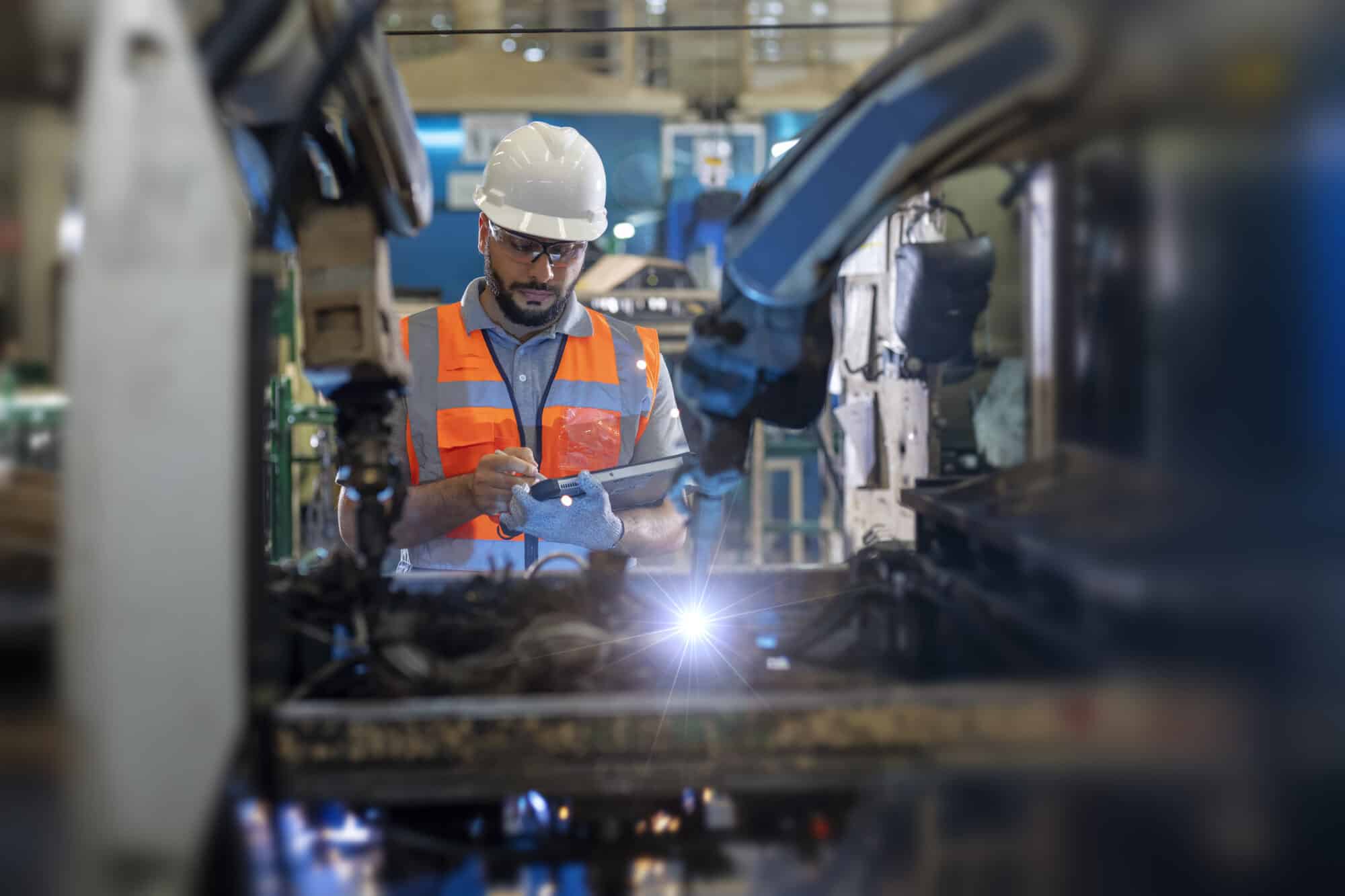
For more than two years, manufacturers have not been able to immediately deduct their R&D expenses—and it’s taken a toll, particularly on small businesses.
What’s going on: For more than 70 years, the U.S. tax code allowed manufacturers to immediately deduct their R&D expenditures. But since the expiration of this key provision in 2022, manufacturers have been required to amortize their R&D costs over a period of years.
Why it’s important: As a direct result of the expiration, manufacturers’ tax bills have increased, according to a new NAM tax explainer released as part of the NAM’s “Manufacturing Wins ” campaign. This means manufacturers are now less able to conduct groundbreaking research and support well-paying R&D jobs.
Uneven playing field: The U.S. is now one of just two developed nations that requires the amortization of R&D expenses.
- The policy makes the U.S. less competitive against China, which offers companies a 200% “super deduction” for R&D costs.
- In 2022, the first full year after the expiration of immediate R&D expensing, the European Union’s R&D growth surpassed that of the U.S. for the first time in nearly a decade—and China’s R&D growth was triple that of the U.S.
What should be done: The NAM is calling on Congress to restore immediate R&D expensing, along with other pro-growth tax provisions.
The last word: “It is imperative that the U.S. tax code support job-creating, life-changing R&D,” said NAM Vice President of Domestic Policy Charles Crain. “Congress must act to bolster manufacturing innovation and American competitiveness by reinstating immediate R&D expensing.”
Congressional Tax Writers Join NAM to Talk Tax Reform
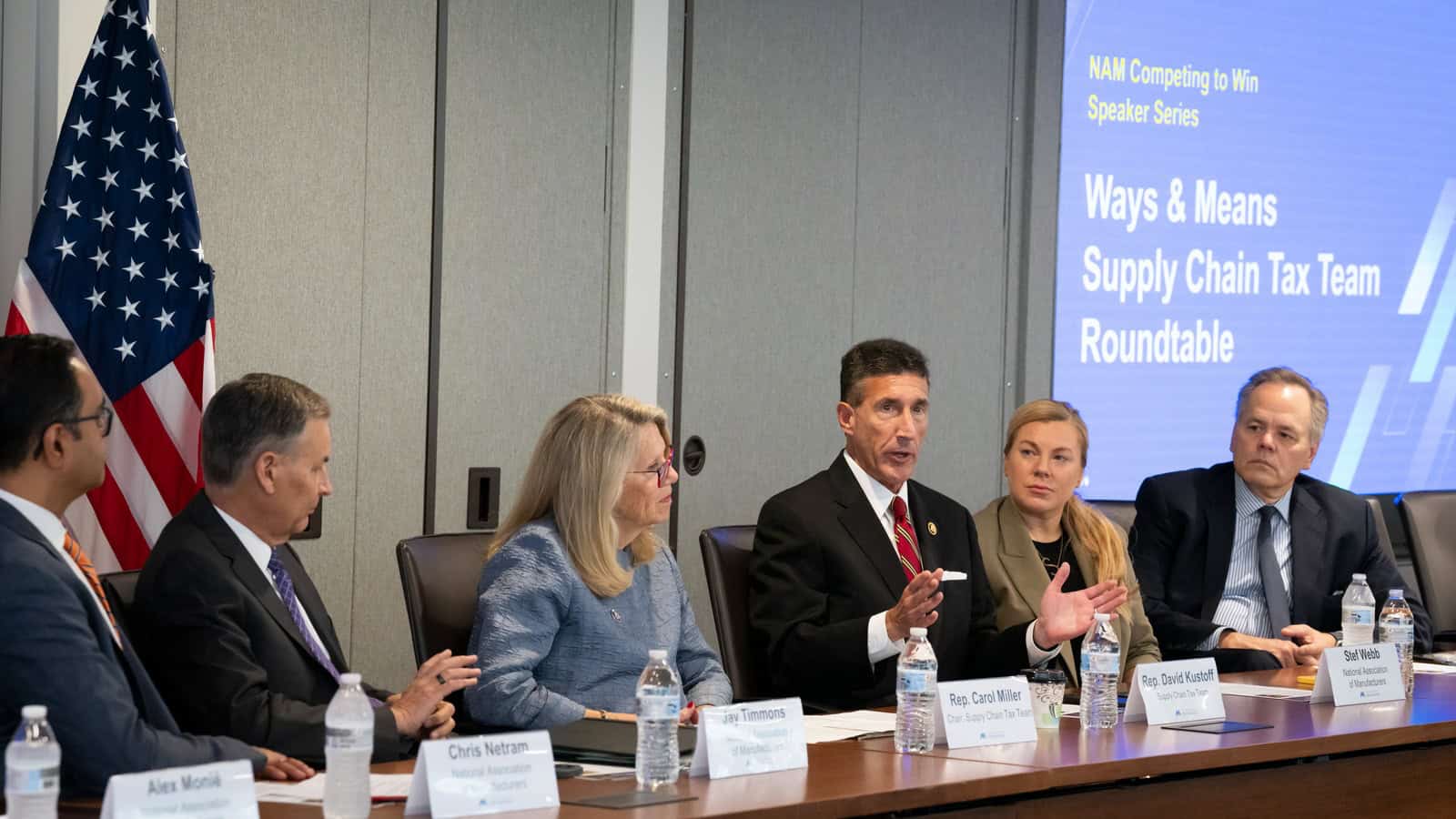
As part of its “Manufacturing Wins” campaign to preserve pro-manufacturing tax provisions, the NAM hosted a roundtable this week with Reps. Carol Miller (R-WV) and David Kustoff (R-TN)—respectively the chair and a member of the Ways and Means Committee Supply Chain Tax Team.
Preparing for 2025: The Supply Chain Tax Team has jurisdiction over the corporate income tax rate. Tax reform reduced the corporate rate to 21%, spurring the creation of thousands of new manufacturing jobs—and the NAM is working with Congress to ensure the U.S. maintains a competitive corporate rate as policymakers debate next year’s “tax Armageddon.”
Understanding the benefits: Rep. Miller emphasized that the dollars saved due to tax reform’s lower corporate rate have supported job creation, higher wages and the flourishing of local communities.
- As a business owner herself, she said she believes it’s important for members of Congress in charge of tax policy to understand the risks businesses take, the communities they support and the certainty they need to be successful.
Measuring the impact: Rep. Kustoff emphasized the importance of real-world data on the benefits of the lower corporate tax rate—from the number of jobs created to the work businesses have done to provide their employees with bonuses and higher wages.
- According to Rep. Kustoff, real-world metrics are important for educating policymakers about the need for action, as crucial, pro-manufacturing tax provisions are set to expire at the end of 2025.
Recognizing the ripples: The discussion also touched on the wider impact of tax increases on global supply chains and the broader U.S. economy.
- Participants noted that a higher corporate income tax rate’s ripple effects would hurt companies throughout the economy—even when those companies are pass-throughs and not explicitly affected by the corporate income tax rate.
- That’s because these small businesses often sell to and partner with larger corporations that would have less capital available under a higher corporate rate.
Our take: “Prior to 2017 tax reform, the U.S. had the highest corporate tax rate among the more than three dozen countries in the Organisation for Economic Cooperation and Development and the third highest in the entire world,” said NAM Vice President of Economic Policy Charles Crain.
- “That put manufacturers in America at an alarming disadvantage. A competitive tax rate helps business compete in the global economy, leads to job creation, investments and purchases of new equipment and allows manufacturers to give back to their communities.”
- “If Congress were to raise the corporate rate, it would force America to take a step back on the global stage—at a time when other countries around the world are implementing more competitive tax agendas.”
Rep. Feenstra Works to Repeal Estate Tax
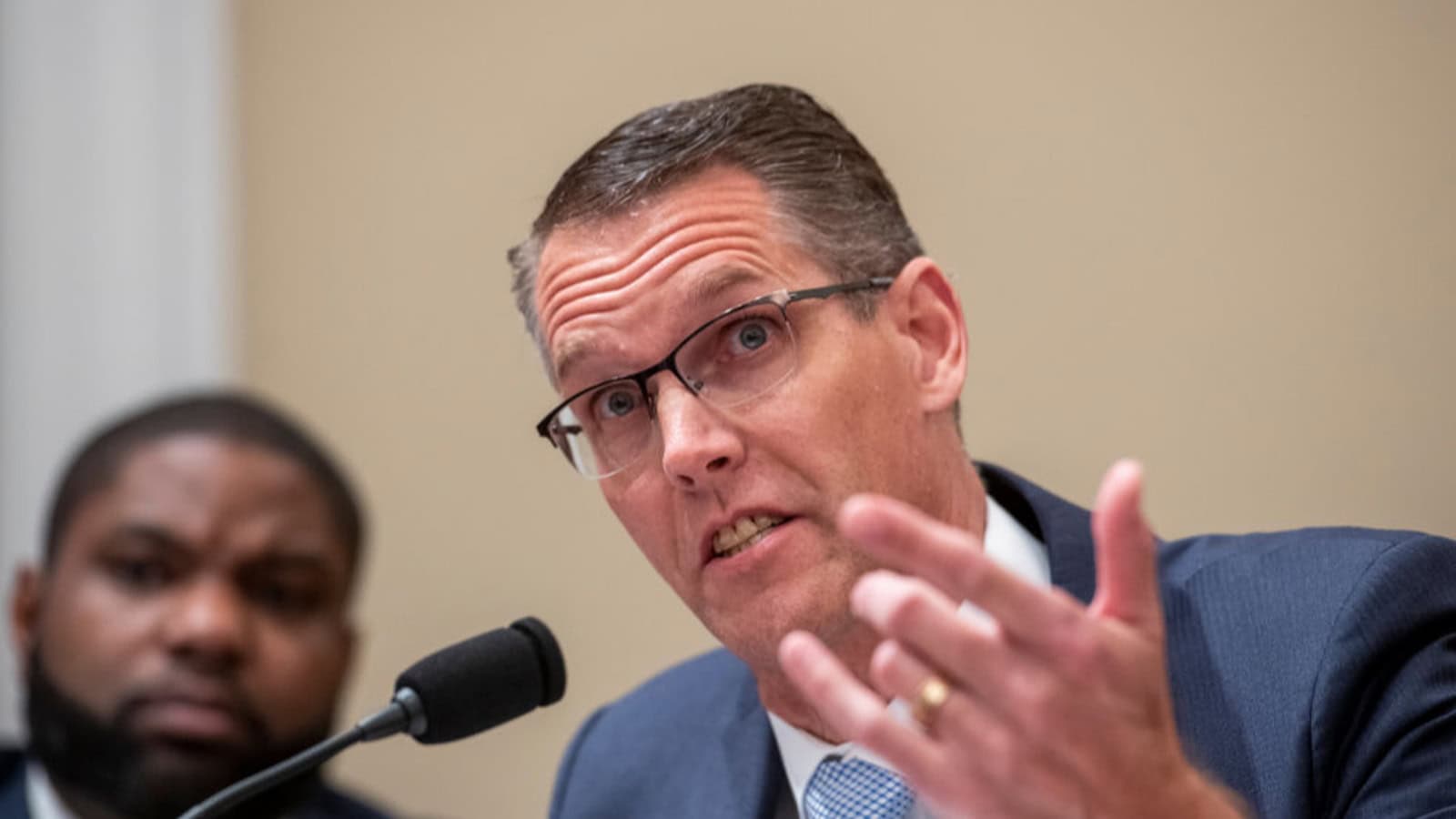
Rep. Randy Feenstra (R-IA), the vice chair of the House Ways and Means Committee’s Rural America Tax Team, is working to shield family businesses across America from damaging tax burdens by targeting the estate tax for repeal.
As part of the NAM’s “Manufacturing Wins” campaign, which aims to protect pro-manufacturing provisions from 2017 tax reform set to expire in 2025, the NAM spoke with Rep. Feenstra about his work and why it matters to manufacturers.
Nixing the tax: Tax reform doubled the valuation threshold under which family-owned businesses’ assets are exempt from the estate tax. While Rep. Feenstra is working to prevent that increased threshold from expiring, he has a bigger goal in sight: repealing the estate tax altogether.
- Feenstra is the sponsor of the Death Tax Repeal Act, which “makes the simple recognition that death should not be a taxable event,” he told us.
- “When a family is grieving, the federal government sends a multimillion-dollar tax bill as condolences. This is simply wrong.”
Listening to owners: Rep. Feenstra and his colleagues on the tax team have spoken to family businesses across the country, including manufacturers. These conversations have made it clear that “we still have a lot of work to do to provide relief from what can be a devastating setback for multigenerational family businesses,” he said.
- “Repealing this tax is going to be one of my top priorities in 2025, and I’m proud to have the support of 170 of my colleagues,” he added.
Persecuting small business: As Rep. Feenstra explains, the estate tax often threatens to destroy small manufacturers, whose value is often tied up in illiquid assets like equipment and facilities.
- “People often don’t realize that businesses over many generations can accumulate assets that can put them over the asset threshold, but that doesn’t mean these businesses have a lot of cash on hand,” he explained. “So, when they’re hit with millions in new taxes, that can sink an already cash-strapped business.”
- “Fortunately, because of the doubling of exemption amount, far fewer businesses face that threat,” he added. However, “As long as any family business does face that threat, we still have work to do.”
If tax reform expires… Rep. Feenstra warns that if tax reform’s estate tax changes expire, many additional smaller businesses will suffer.
- “A lot more people would be hit by the death tax, and the people who are hit would be paying a much higher tax,” he said.
- “These are small family businesses we are talking about, and if the current exemption amount is allowed to return to half its current value, that means the size of the businesses getting hit are much smaller than they are today.”
The last word: “As we go into 2025, we need to be focused on policies that support growth and help [family-owned] businesses succeed, not create costly obstacles for them to overcome,” Rep. Feenstra concluded.
Learn more: You can read our full Q&A with Rep. Feenstra here and learn more about the NAM’s “Manufacturing Wins” tax campaign at NAM.org/MfgWins.
Estate Tax: A Q&A with Rep. Randy Feenstra
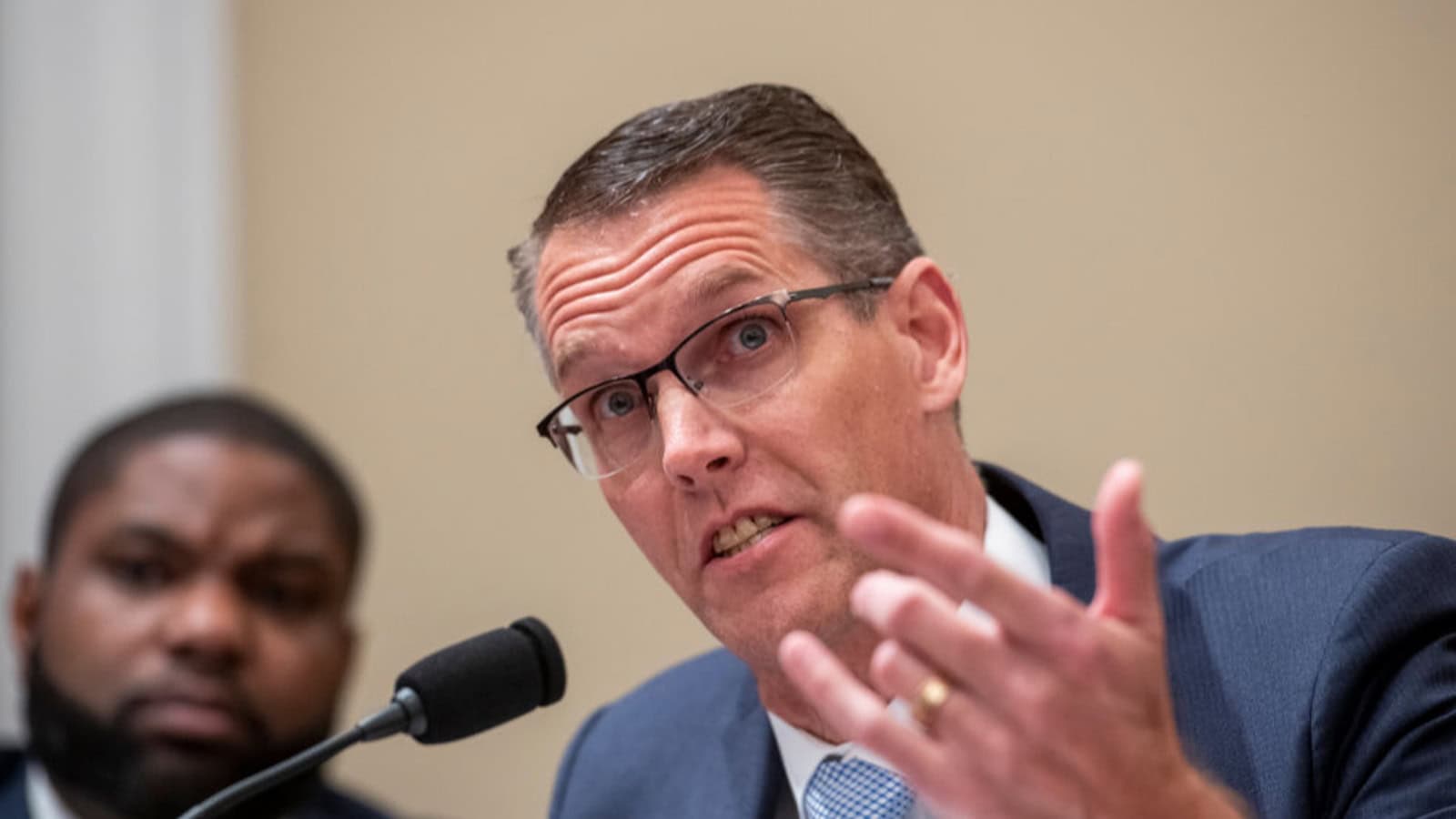
The NAM recently interviewed Rep. Randy Feenstra (R-IA), the vice chair of the House Ways and Means Committee’s Rural America Tax Team, about the estate tax and why he’s working with colleagues on Capitol Hill to repeal it.
NAM: Rep. Feenstra, Congress is facing a “Tax Armageddon” next year, as crucial provisions from 2017’s Tax Cuts and Jobs Act are set to expire. As a member of the Ways and Means Committee, what is your focus moving into next year’s debate?
Rep. Feenstra: One of those crucial provisions from the Tax Cuts and Jobs Act that is set to expire is the doubling of the estate tax exemption amount, which currently sits at $13.6 million in 2024. After 2025, it will return to half that amount, adjusted for inflation. That change in the Tax Cuts and Jobs Act was another important step toward full repeal of the estate tax, which my Death Tax Repeal Act would do. The bill makes the simple recognition that death should not be a taxable event. When a family is grieving, the federal government sends a multimillion-dollar tax bill as condolences. This is simply wrong.
I’m proud to co-chair the Rural America Tax Team, which has dug into this issue of the “death tax” and the impact it is having on family businesses across the country. As the tax team has spoken to family businesses and estate tax experts from across the country, it’s become increasingly clear that we still have a lot of work to do to provide relief from what can be a devastating setback for multigenerational family businesses. Repealing this tax is going to be one of my top priorities in 2025, and I’m proud to have the support of 170 of my colleagues.
NAM: The estate tax is imposed on family-owned businesses when ownership of the business passes to the next generation following the death of an owner. As you mentioned, the TCJA doubled the exemption threshold, excluding more assets from taxation and thus reducing the burden of the estate tax on businesses. Why is this important and what is Congress doing to preserve this higher threshold?
Rep. Feenstra: Over the years, various bills have taken steps toward providing relief for taxpayers hit by the death tax. The Tax Cuts and Jobs Act was one of the largest expansions of that relief, significantly reducing the number of family businesses hit by the tax and reducing the tax burden for those businesses that still are. People often don’t realize that businesses over many generations can accumulate assets that can put them over the asset threshold, but that doesn’t mean these businesses have a lot of cash on hand. So when they’re hit with millions in new taxes, that can sink an already cash-strapped business. Fortunately, because of the doubling of the exemption amount, far fewer businesses face that threat. As long as any family business does face that threat, we still have work to do.
NAM: At the end of 2025, the estate tax is scheduled to be reduced by half, subjecting more of family-owned manufacturers’ assets to taxation and increasing their estate tax liability. As the Ways and Means Committee and tax teams continue meeting with businesses around the country, what are you hearing on the impact this change would have?
Rep. Feenstra: Two things: A lot more people would be hit by the death tax, and the people who are hit would be paying a much higher tax. These are small family businesses we are talking about, and if the current exemption amount is allowed to return to half its current value, that means the size of the businesses getting hit are much smaller than they are today. People often think of farms, and that’s certainly true, but as you know, manufacturers are hit, family-owned restaurants, auto dealers, you name it. As we go into 2025, we need to be focused on policies that support growth and help these businesses succeed, not create costly obstacles for them to overcome. If the exemption amount falls to its pre–Tax Cuts and Jobs Act level, that’s a lot of new businesses that are going to be hit by this tax.
Rep. Chavez-DeRemer Urges Pro-Growth Tax Policy at Miles Fiberglass
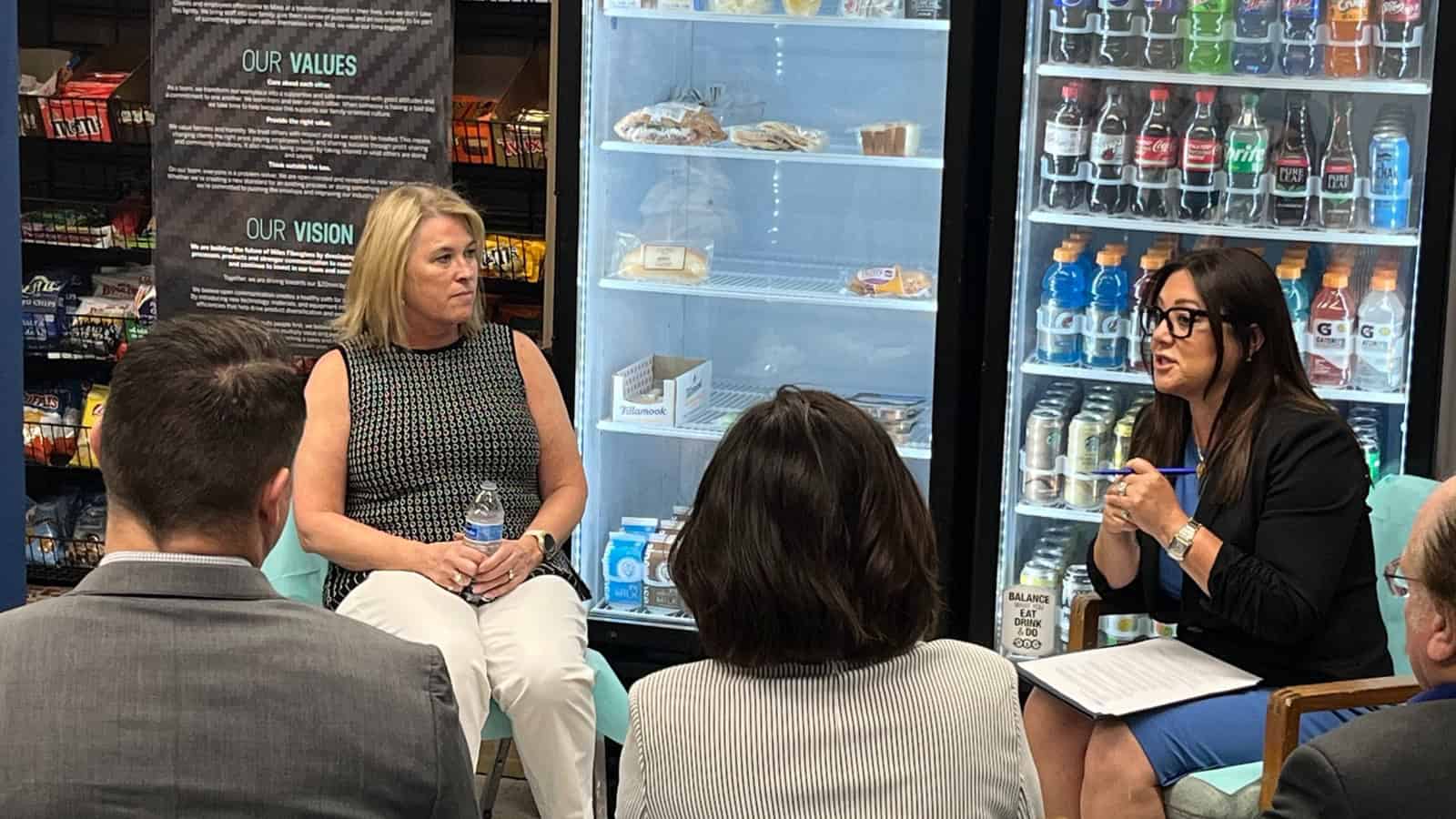
Congresswoman Lori Chavez-DeRemer (R-OR) visited Miles Fiberglass & Composites in Clackamas, Oregon, for a roundtable discussion with local manufacturers and other business leaders on the critical need to protect manufacturing-friendly tax policies. Moderated by Miles Fiberglass President and owner and NAM board member Lori Miles-Olund and attended by representatives of the NAM and Oregon Business & Industry, the discussion centered on the importance of preserving the 2017 Tax Cuts and Jobs Act, which has been a lifeline for small manufacturers.
Stimulating growth: “The 2017 Tax Cuts and Jobs Act freed up capital for us to hire more people, invest in new equipment and increase wages,” said Miles-Olund. “It’s essential for manufacturers like us to have a pro-growth tax code that allows us to stay competitive and innovate.”
- The 2017 reforms lowered the corporate tax rate and provided a 20% pass-through deduction for small businesses, boosting their growth for the past seven years.
- However, with key provisions set to expire in 2025, many manufacturers are concerned about the harm to their businesses if Congress fails to act.
A looming threat: Rep. Chavez-DeRemer addressed the impending expiration of these tax provisions, saying, “We cannot afford to return to a tax system that punishes manufacturers for investing in the U.S.”
- She also highlighted the economic ripple effects of tax hikes, noting that when manufacturers are forced to scale back investments, it affects not just their operations but also their suppliers and communities.
- OBI President and CEO Angela Wilhelms echoed these concerns. “Preserving these tax reforms is essential to ensuring that Oregon businesses remain competitive on a global stage,” she said.
Empowering women: Rep. Chavez-DeRemer also discussed the importance of empowering women in the manufacturing sector. She praised Miles Fiberglass’ efforts to recruit more women, adding that legislation like the National Apprenticeship Act can help open doors for women and close the skills gap in manufacturing.
The last word: “We need policies that allow manufacturers to thrive,” Rep. Chavez-DeRemer said. “Congress must prioritize protecting jobs, ensuring economic stability and keeping American manufacturing competitive.”
If you want to add your voice to the fight for tax reform, or host legislators for a facility visit, check out the NAM’s “Manufacturing Wins” campaign.
Small Manufacturers Speak Out Against the Estate Tax

Passing on the family business can also mean passing on a big tax bill, and family-owned manufacturers are speaking out to keep those bills from getting any bigger.
What’s happening: As part of its “Manufacturing Wins” campaign to preserve 2017 tax reform, the NAM is calling on Congress to secure the law’s changes to the estate tax.
- Tax reform increased the estate tax exemption threshold, which protects some of a family-owned business’s assets from the tax.
- The threshold is set to be slashed in half at the end of 2025, subjecting more of family-owned manufacturers’ assets to taxation and making it harder for them to pass their business on to the next generation.
Protecting physical assets: Manufacturers constantly invest in physical assets like facilities and machinery to stay competitive, making the estate tax especially damaging.
- “We’re not a liquid company,” said Tom Tredway, president of Erie Molded Packaging in Pennsylvania. “Almost every penny we earn is poured back into our business so we can grow and compete. The increased estate tax exemption threshold is set to expire at the end of 2025, which will threaten my ability to pass the business on to my children.”
- “The estate tax doesn’t just hurt family businesses—it hurts the workers,” added Scott Livingston, president and CEO of HORST Engineering in East Hartford, Connecticut. “It also hurts our customers and the communities that we serve.”
Preserving company values: For Click Bond, a family-owned adhesives manufacturer in Carson City, Nevada, paying a higher estate tax bill could mean compromising the business’s vision and values.
- “We may have become a family business by happenstance, but we remain one by strategy,” said CEO Karl Hutter. “With reduced lifetime estate tax exemptions, family businesses will face the threat of having to liquidate, divest or take in outside capital that may not align with their strategy or values simply to create liquidity to pay a tax bill.”
- “The estate tax rips financial resources from productive organizations,” said Dave True of the 76-year-old True Companies in Casper, Wyoming. “These financial resources are critical to small companies and the families they support.”
Saving livelihoods: For some families, the estate tax threatens to turn a death in the family into the death of the business.
- “When I lost my husband to brain cancer, not only did I have to worry about keeping the business afloat, but I also had to worry about a looming tax bill that might have forced us to halt production altogether,” said Courtney Silver, president and owner of Ketchie, Inc. in Concord, North Carolina.
- Silver, who chairs the NAM’s Small and Medium Manufacturers Group, continued: “If not for the federal estate tax exemption being increased in 2017, Ketchie might not be here today.”
The last word: Lori Miles-Olund, the third-generation owner and president of Miles Fiberglass & Composites, Inc. in Clackamas, Oregon, put it simply: “Congress must preserve the increased estate tax exemption to protect family-owned businesses like ours from potential insolvency when the owner passes away.”
The Estate Tax, Explained

Congress should preserve tax reform’s changes to the estate tax, protecting family-owned manufacturers from tax increases scheduled for the end of 2025, according to a new explainer published by the NAM as part of its “Manufacturing Wins” tax campaign.
The background: In 2017, tax reform doubled the value of assets that could be exempt from the estate tax, a levy imposed on family businesses upon the death of their owners, when proprietorship passes to the next generation.
What’s going on: This valuation threshold is scheduled to be cut in half at the end of 2025, subjecting more assets of family-owned manufacturers to taxation and increasing these companies’ tax liability.
Why it’s important: A bigger tax burden would threaten the continued existence of family-owned companies and make it more difficult to pass family businesses on to the next generation.
- These firms could be forced to liquidate operation-critical assets, such as facilities and equipment, in order to pay the estate tax.
- An increased estate tax bill could mean that family-owned manufacturers are forced to take on debt, limit operations, reduce employee headcount or close entirely following the death of a loved one.
What else is at risk: Some legislators have floated the idea of repealing or limiting stepped-up basis, which stops a business owner’s heirs from being forced to pay capital gains taxes on asset appreciation that took place while the owner was alive.
What must be done: “Congress must preserve tax reform’s increased estate tax exemption threshold and maintain stepped-up basis,” said NAM Vice President of Domestic Policy Charles Crain.
- “Protecting family-owned manufacturers from the estate tax will prevent these small businesses from incurring costly and damaging tax bills that threaten their viability following the death of a loved one.”
An Iowa Manufacturer Urges Congress to Preserve Tax Reforms

Manufacturers are counting on Congress to preserve tax reforms that acted as “a shot in the arm” but are now at risk of expiring, Sukup Manufacturing Co. President and CEO Steve Sukup told the House Ways and Means Committee recently.
What’s going on: The committee held a field hearing at the Iowa State Fair in Des Moines last month to hear from local companies about the impact of the 2017 Tax Cuts and Jobs Act on their businesses.
- At Sukup—the world’s largest family-owned and -operated maker of grain storage, drying and handling equipment—tax reform is credited as the single biggest driver of growth in recent years.
- “Sukup has grown over the past several decades, but nothing compares to when the Tax Cuts and Jobs Act was signed into law,” Sukup told committee members. “For example, thanks to the lowering of the corporate rate to 21%, Sukup grew our workforce by a third, adding roughly 200 well-paying manufacturing jobs to our community.”
A business boon: The 61-year-old company was able to make several key investments thanks to tax reform.
- Among these is Sukup’s Safe T Homes, quick-assembly houses made from the company’s grain bins and created after the 2010 earthquake in Haiti to provide people with much-needed shelter. One of the homes was on display at the fairgrounds.
- Another undertaking made possible by tax reform was the world’s largest free-span grain bin, two corn storage containers made for an ethanol plant in Mason City, Iowa. Each bin has a record-breaking capacity of 2.2 million bushels.
- Tax reform’s accelerated depreciation schedule allowed the business to go “from roughly $5 million in capital spending to almost $15 million,” Sukup told committee members.
What’s in jeopardy: The expiration of key tax provisions in 2022 and 2023—with more tax increases scheduled for the end of next year—has made it far more difficult for Sukup to put money back into the business.
- For example, tax reform’s pro-growth interest deductibility standard expired in 2022, making debt financing more expensive. “An accountant once told me, if you don’t have debt, that means you’re not coming up with new ideas,” Sukup said. “Many manufacturers like us borrow funds to finance essential long-term investments,” which are now more costly.
- Sukup is also monitoring looming changes to the estate tax. He called on Congress to protect family-owned manufacturers from the estate tax “so that I can ensure the third and fourth generations of Sukups can continue in our family business.”
Keep it going: Sukup ended his testimony by reiterating the advantages tax reform brought to his business and emphasizing the need for Congress to preserve tax reform in full.
- “Because of these policies, we’ve been able to not only maintain our business, but to provide a great living, health benefits and soon expanded child care for our employees and the community—even as we aid those in need around the globe,” he concluded.
- “I urge you to help us keep that growth streak going. Maintaining the 21% corporate rate, as well as the tax provisions I just described, is so important to manufacturers everywhere.”
